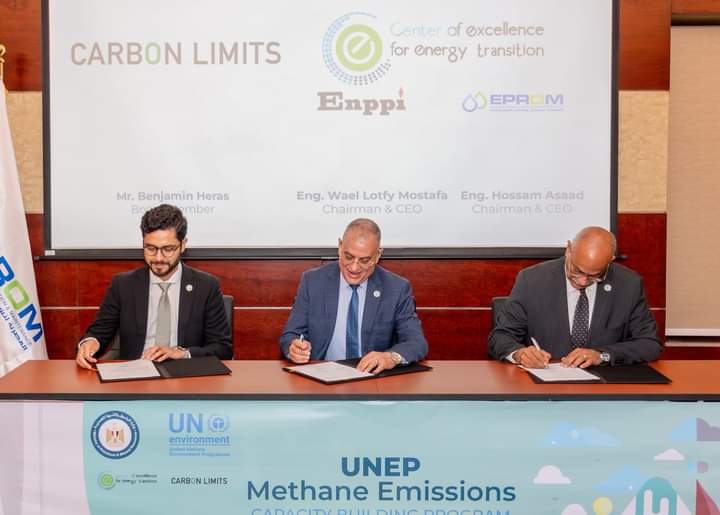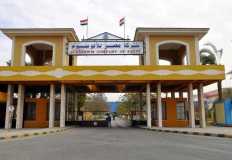
Following the global movement towards environmental protection, resource optimization, and developing energy transition strategies, Egypt's "Center of Excellence for Energy Transition," affiliated with the petroleum sector, under the patronage of Engineer Tarek El Molla, Minister of Petroleum and Mineral Resources, has signed a memorandum of understanding (MoU) with Carbon Limits Norway.
This Norwegian company specializes in measuring and reducing
methane emissions from the oil industry, aligning with Egypt's Vision 2030
goals.
A notable achievement is that the Center of Excellence for
Energy Transition, is a joint effort by ENPPI and IBPROM. This center serves a
unique purpose: it's the first strategic entity specializing in aiding Egypt
and Africa's oil and energy-intensive sectors in transitioning to sustainable,
low-carbon energy systems. This directly supports the oil sector's emissions
reduction and energy transition strategy. The center offers a comprehensive
package, including innovative energy efficiency services, theoretical and
practical training, and awareness programs for Egypt's and Africa's oil, gas,
and broader energy sectors.
The MoU signatories included Engineer Wael Lotfy Mustafa
(ENPPI Chairman and Managing Director), Engineer Hossam Asaad (IBPROM Chairman
and Managing Director), and Benjamin Harris (Carbon Limits Norway Board Member
and Representative).
The ceremony was well-attended by dignitaries such as
Engineer Alaa Hagar (Undersecretary of Petroleum and Mineral Resources),
Norwegian Ambassador Hilda Klemetsdal, Dr. Ahmed El-Beltagy (EU Director of
Climate, Energy and Transport), Dr. Tharwat Maqlad (UNEP Regional Director for
the Middle East and North Africa), and Kato Keen (JICA Representative). Funding
banks, embassy representatives, petroleum sector leaders, company chairs, and
Center of Excellence for Energy Transition officials were also present.
This signed MoU marks a significant step towards
implementing the petroleum sector's energy transition strategy and developing a
low-carbon oil and gas approach.
It establishes a framework for collaboration to address
carbon removal and reduce greenhouse gas emissions in the oil, gas, and broader
energy sectors.
Engineer Alaa Hagar commended the Center of Excellence for
Energy Transition in his speech, acknowledging the collective effort. He
expressed confidence that the center will be a cornerstone in achieving the
petroleum sector's emission reduction and energy transition goals.
Engineer Hagar emphasized Egypt's strong commitment to
collaborating with international institutions and global companies on green
energy and emission reduction initiatives. This cooperation is crucial for
achieving Egypt's goals of becoming a leading green energy market and a hub for
trading all forms of energy.
He underscored that the oil sector's focus on green energy
and emissions reduction aligns with Egypt's overall climate change strategy,
presenting a valuable opportunity for partnership with the Norwegian company
following further exploration.
ENPPI's Chairman, Engineer Wael Lotfy, and IBPROM's
Chairman, Engineer Hossam Asad, welcomed the attendees and echoed their
support. They highlighted the significance of choosing ENPPI as a partner for
launching the Center of Excellence, emphasizing ENPPI's expertise and
commitment to providing ongoing support. This collaboration aligns with the
petroleum sector's scientific and practical approach to achieving sustainable
development goals.
Engineer Lotfy outlined the center's four key focus pillars:
capacity building, consulting services, data management, and research and
development. He emphasized that the MoU signifies a collaborative response to
the critical challenges of climate change. The center's mission is to deliver
sustainable and low-carbon energy solutions through promoting energy awareness,
reducing emissions, and adapting to climate impacts.
Engineer Hossam Asaad concurred, highlighting the vast
opportunities for energy efficiency projects in Egypt. He emphasized the
center's role in supporting energy entities across Egypt and Africa to become
more efficient and address these issues intelligently.
He also emphasized the importance of cooperation with Carbon
Limits, a collaboration that strengthens the transition to sustainable and
low-carbon energy systems.
Benjamin Harris, representing Carbon Limits Norway,
acknowledged Egypt's diverse energy resources. He highlighted Egypt's vital
role not only as a resource-rich country but also as a key player in carbon
reduction and developing related strategies.
He reaffirmed their unwavering commitment to collaborating
on promoting energy transition initiatives within the Egyptian petroleum sector
and tackling these challenges head-on.





